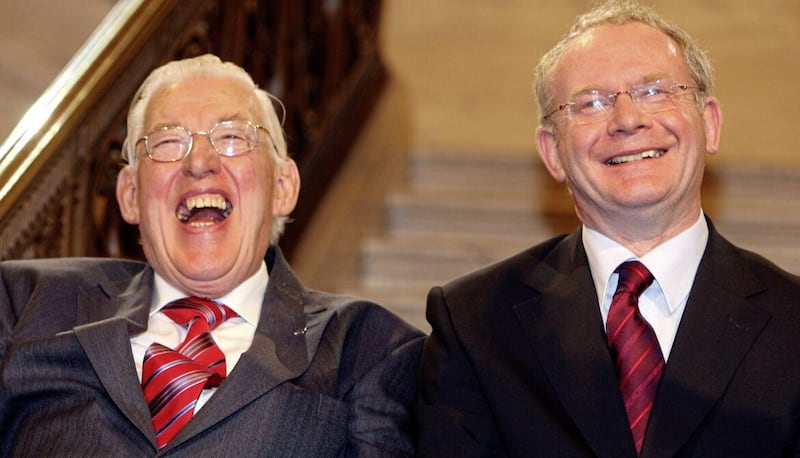Monday night’s meeting really is a crunch moment for the DUP.
That’s because the DUP doesn’t really have crunch meetings as such. Big policy decisions are made at officer level, along with input from other key players and representative groups and then nodded through by the party executive. That process has worked reasonably well for most of the party’s history—even though there were a few blips during the bumpy leadership journey from Foster to Donaldson a couple of years ago.
And that history has included many moments of surprising flexibility: 1998, when it decided to forget about destroying the GFA and, instead, make plans for ‘a fair deal, a better deal’; 1999, when it agreed to join the executive (before the IRA had decommissioned), even though it chose to sit outside rather than inside the actual meetings; 2006, when it had discussions with SF at St Andrews and laid the foundations for a bespoke ‘ourselves together’ arrangement; and 2007, when it did the Paisley/McGuinness deal and lost Jim Allister and a handful of minor figures as members.

The meeting will probably include a fair few mentions of surrender, sellout, rollover, U-turn, betrayal, Lundyism and, for good measure, Vichy. Indeed, they’ve already been heard quite a few times since the email summoning the party executive was leaked on Friday evening. I say leaked but, let’s be honest, everybody and his wife knew it would be ‘out there’ within minutes of the send button being hit. It may even suit the interests of Donaldson’s supporters, allowing them to point the finger at those who are ‘deliberately’ trying to damage the party by undermining internal processes and playing into the hands of its enemies.
What Donaldson will remind the meeting is that people without an electoral mandate don’t have big decisions to make. Those with a very small mandate are rarely in the room when big decisions have to be made, either. So, they have the luxury of being permanently never-bending purists. But those with a mandate, those in the room when the decisions have to be made, are obliged to deal with reality and the consequences of their decisions. A series of court rulings has made life difficult for the DUP and for unionism generally. A series of parliamentary majorities—some whopping—have made life difficult, too.
All of which means that the DUP officers (and I’m presuming Donaldson has the majority on his side already and may even have put his decision to their vote before the meeting) and executive have to decide whether to make decisions within the parameters of the present realities or reject what’s on offer from the government. Either of those decisions brings profound consequences for the party, but a decision is now unavoidable.
Donaldson doesn’t actually need the approval of the executive (the DUP is a top-down one in terms of policy decisions), but maybe he’ll want to thrash out the realities with his internal opponents. Challenge them, for instance, to set out what they would do that he hasn’t done, or how they would change the minds of those at Westminster and EU levels who haven’t shown any great willingness to back the DUP.
Having watched Donaldson’s speech in the House of Commons last Wednesday, as well as reading the full text a couple of times, it was hard to avoid the whiff of endgame about it. Although whether it was endgame for the DUP boycott, for devolution entirely, or even for Donaldson’s leadership was harder to tell. Perhaps, just perhaps, he thought it might well be his last parliamentary speech as DUP leader and the first step on the path to retirement as Lagan Valley MP.
Whatever happens on Monday night for the DUP will be important—even if it fluffs it all and provides us with another damp squib. It has to be endgame for one side or the other.






